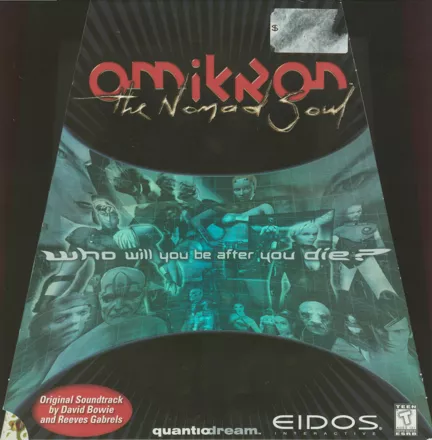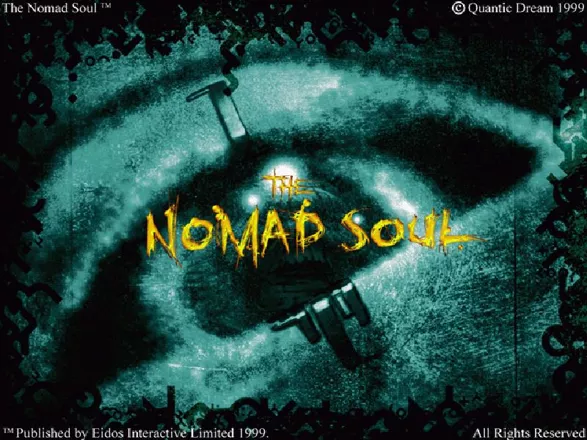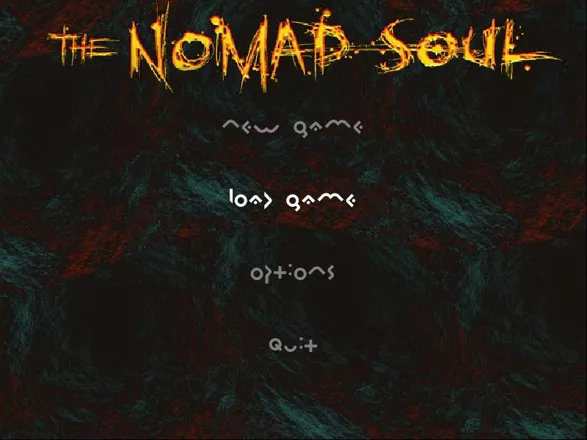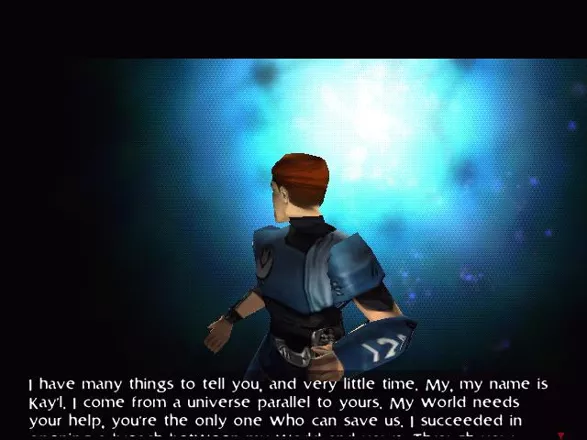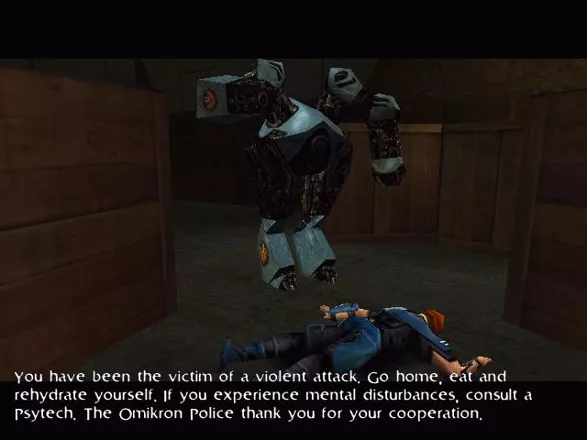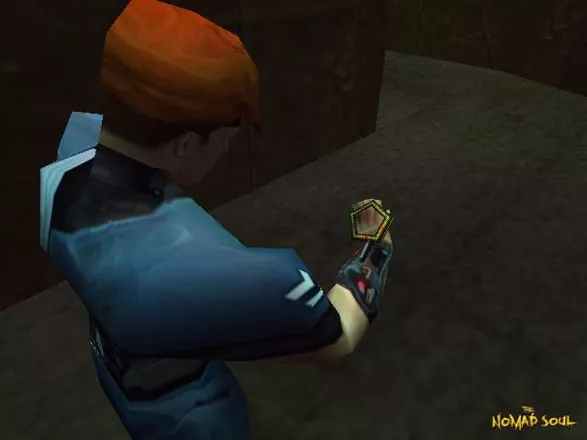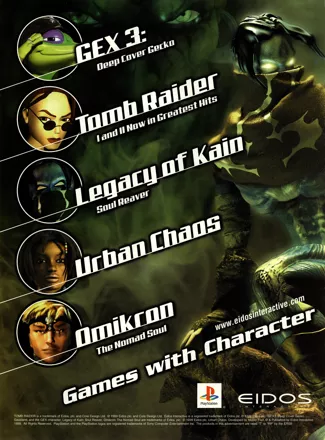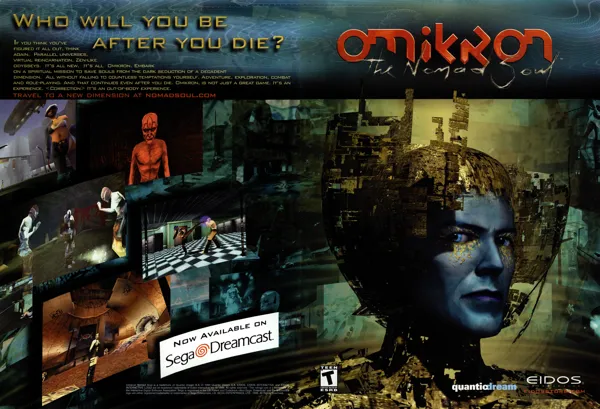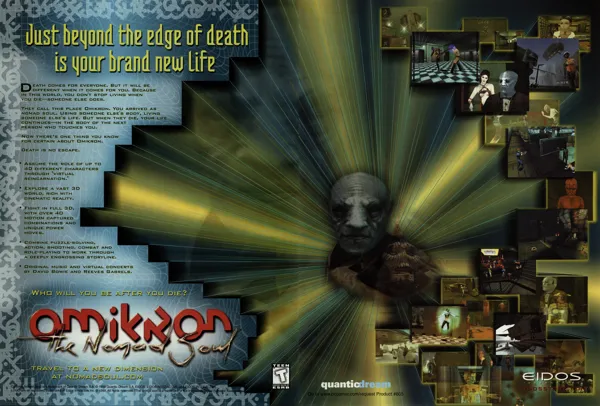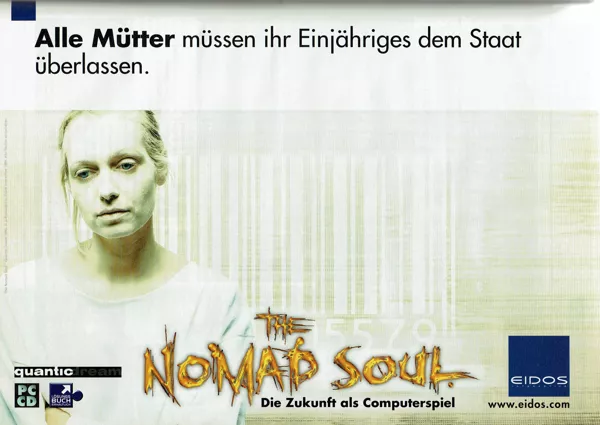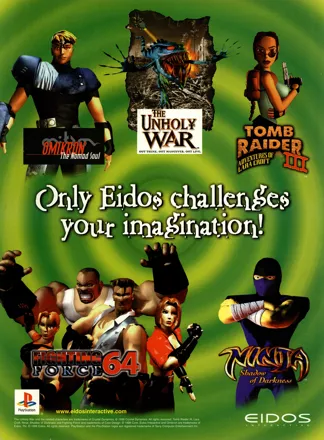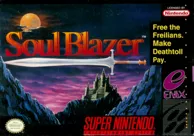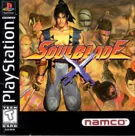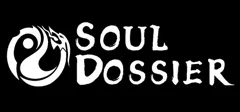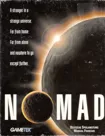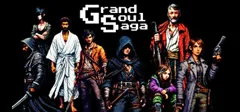Omikron: The Nomad Soul
Description official descriptions
The futuristic city of Omikron on the planet Phaenon is sprawling beneath a huge crystal dome. It was erected to protect the city against the ice age which descended upon the planet after its sun ceased to exist. At the beginning of the game, the player is contacted by an Omikronian police officer named Kay'l 669, who begs him to leave his dimension, possess Kay'l's body, and enter Omikron to investigate a series of strange murders. The player then takes the role of Kay'l, but his investigation is foiled by a sinister force that the police are unable - and perhaps unwilling - to stop. As the plot unfolds, the player realizes that in order to solve the mystery his soul must establish contact with many inhabitants of Omikron, and ultimately save it from extinction.
Omikron: The Nomad Soul is primarily a free-roaming third-person 3D adventure game. Much of the player's activity in the game consists of exploring the large city, which is separated into five districts. The player is generally free to roam the city regardless of the plot development. Certain buildings can be entered and explored. Automatic taxi-like vehicles called "sliders" can be hailed to shorten walking distances and deliver the protagonist straight to the goal. In order to advance the story, information must be gathered by communicating with characters and solving puzzles of various kinds, inventory- as well as logic-based. The emphasis of the gameplay, however, is on exploration and interaction rather than on puzzle-solving.
Throughout the course of the game, the player may take on the role of up to 41 different characters through the use of the soul transfer ability. In many situations, a soul transfer is required to solve a puzzle and advance the plot, e.g. accessing a restricted area with a specific character who is able to enter it without arousing suspicion.
Besides the adventure mode, the game also contains first-person shooter and fighting gameplay. These two modes are restricted to specific areas and are for the most part triggered by plot advancement. Once an FPS sequence has been initiated, the player must complete it in order to be able to return to the main adventure mode. Weapons and items for this mode can be found throughout the stages themselves, as well as bought in shops during exploration.
The fighting sequences are also usually dictated by the plot. They take place on side-scrolling screens and consist of traditional exchanges of punches and kicks, with the goal of depleting the opponent's health bar. Each character has different initial fighting statistics. These can be increased by taking the characters to a training facility and practicing to increase their parameters and subsequent combat performance.
Groups +
Screenshots
Promos
Videos
Add Trailer or Gameplay Video +1 point
See any errors or missing info for this game?
You can submit a correction, contribute trivia, add to a game group, add a related site or alternate title.
Credits (Windows version)
167 People (128 developers, 39 thanks) · View all
| Product Development Lead | |
| Product Manager | |
| Public Relations | |
| Localisation | |
| Translation |
|
| German Quality Assurance |
|
| Audio Direction | |
| Recorded at |
|
| Pro-Tools Giants |
|
| Voice Talents | |
| [ full credits ] | |
Reviews
Critics
Average score: 78% (based on 53 ratings)
Players
Average score: 3.7 out of 5 (based on 91 ratings with 6 reviews)
The Good
I loved the the surrealistic game world. When the game was released, it was one of the first with large level real estate for the player to explore. The levels were also designed to work like a real city with realistic layouts, entrances and exits. One can easily get lost just exploring the world. The game-play also allows the player to change his character as he wishes which adds another layer to explore. The background score, the music and the SFX all add to the surrealism as well as the cool fonts. The mixed style of game-play and engaging puzzles keeps the player's attention and the player on the edge of his seat.
The Bad
The art quality is what carries the game. Even though the game was one of the first to create a mixed style of game play, a First Person Shooter, hand to hand combat, adventure and mystery, etc., it fails to blend them properly. The game-play is fairly complex for a normal player. The game did not allow mouse input. This is a problem as players need to get adjusted to the camera angles. This can get nauseating.
The Bottom Line
A game that allows you to live a day in an alien universe. A bizarre murder, ancient alien history, magic and ancient runes and puzzles coupled with surrealistic music.
Windows · by DS___ (7) · 2010
The Good
The Nomad Soul is, and I'm not going to hesitate saying it; the best all round game I've had the privilege to play; from the story-line to the beautiful design and complex gameplay, there is just no flaws in this game. Quantic Dream have spent a lot of time designing the virtual world that is 'Omikron' which spans over four vast cities. The plot is very in depth and I also really like the whole demon thing. It was done really well.
The moment Omikron loads a portal opens and we are introduced to police officer named Kayl through some sort of portal he tells you his world is in danger and you need to transfer your soul into his body in order to help him out; once you have possessed Kayl's body you will need to find out more about him and what was it he was so afraid of, you will need to go to considerable lengths accessing classified case files as to what happened to Kayl and his deceased partner Den, the story unfolds and you begin to learn that the Police force as well as the government itself is run by a secret society of Demons disguised in human form brainwashing to people of Omikron and offering their souls to Astaroth thus making him stronger to a point where he will have total control over Omikron you will be faced by these entities throughout the game and also the Omikron Police via FPS or Tekken style fighting, otherwise the rest of the game is pure adventure which a few puzzles chucked in for good measure.
In the game you can possess a number other bodies doing whats called a 'Soul Transfer' this is a cool feature but only can be used on select inhabitants, i used Kayl as far in the game as I could, but sadly it was inevitable that he dies.
There is also some very interesting shops/bars you can walk into in Omikron, like strip joints/sex shops etc also good if you have the nude patch running might i add. There is also some illegal concerts held at random bars in the cities of Omikron in which 'The Dreamers' preform a number of live shows featuring David Bowie on vocals I think that was a very original idea even though I'm not a big fan of David Bowie as such but I enjoyed it nonetheless.
Its just sheer brilliance in so many aspects, when you are hooked on this game reality seems to fade I was at my PC for days until i finished it, I was very sad when it ended. Part two better be released or I am going to be sending a lot of hate mail.
The Bad
Its very easy to get lost in Omikron this is not a bad thing however. It just shows that the game is that big. The controls take a bit of time to learn, but you will get the hang of it in not so long. The Nomad Soul also has certain 'savepoints' in which you must possess a number of Magic Rings in order to save your game, this makes things a little bit more challenging but only the slightest; rings can be found all over the place so they are quite abundant.
The Bottom Line
Plot, Gameplay, Graphics, and FREEDOM = Omikron.
Quantic Dream have stated they will release a sequel (Omikron: KARMA previously known as EXODUS) but there is a lot of uncertainty right now as to where this is going there has not been much news about it to date. Whoever f**ks this up is going to get my upmost abhorrence. Just like Bioforge 2, and Privateer 3 and Full Throttle 2... why do they even bother if they are not going to give us the final product. Leaving us on the edge. That is just heresy in my belief.
I also played QD's latest release FAHRENHIET/INDIGO PROHECY that was good for what it is but it was too cinematic, please Quantic Dream if you do release 'Omikron: Karma' do not deprive it of gameplay like that.
Windows · by Kurt Murphy (4) · 2006
The Good
Nomad Soul is the first creation of the extravagant French designer David Cage and his development team Quantic Dream. It is a hybrid game that is hard to categorize - an ambitious project that attempts to build up complex gameplay rooted in traditional adventure.
At its heart, Nomad Soul is indeed a pure adventure game: running around while completing tasks and solving puzzles occupies by far the largest portion of the game. Other elements, such as shooting and fighting sequences, appear as segments that have very little to do with the core gameplay, breaking the game's pace abruptly and providing a change from the rather slow gameplay. But Nomad Soul is much more than just a fancy 3D adventure with action mini-games. One of the game's main appeals is its open world and physical interactivity with it.
There are similarities to Shenmue, which was released shortly afterwards. Both games present graphically impressive, detailed, fully populated 3D cities with many realistic touches. In Nomad Soul, for example, you can eat in order to increase your energy level, buy books in stores and then read them, get a drink, chat with unknown people sitting on benches, visit striptease shows, and even make love to your girlfriend. However, the differences between this title and its Japanese counterpart are numerous; plainly said, Nomad Soul is a better game. Its world is noticeably larger; its exploration possibilities much more varied thanks to physical interactivity (jumping, swimming, etc.); it doesn't dwell on menial tasks and instead keeps pushing the narrative forward; and instead of arcadish QTEs it offers real challenge both in puzzle-solving and in its action sequences.
As in most free-roaming games, the world is the star here.The city is divided into several districts and there are some plot-related restrictions on exploration; but once it opens up to you, it becomes a vast area you can run around and explore to your heart's content. It is stylishly gorgeous, detailed, and teeming with life. There are many buildings you can enter, and many items to buy or find. Tired of fulfilling an ancient prophecy or stuck at a tough puzzle with cryptic clues? Go to a bar and have a drink, look for fights, or spy on characters you can possess with your unique abilities. You can simply take a break from the main story almost whenever you want and see what the city has to offer.
The most famous gimmick of Nomad Soul is the ability to control multiple characters. There is no protagonist in the game except yourself - or, better to say, your soul. By extracting souls from other characters you can possess and control them. Some parts will force you to control a specific character, but for the most time you'll be free to choose which one of the available characters you want to control. The characters all have their own strengths and weaknesses, which is important, since you'll also be using them in fighting and shooting modes. Every character has their own background information including name, age, profession, and address. It is fun to control different people, from an ordinary female student to a legendary ancient warrior. The cool part is that in many cases you can visit their apartments and find unique items there.
Visually, Nomad Soul is astounding. Each zone in the city of Omikron has its own distinct personality, modeled after popular scenarios such as a dark cyberpunk-like district with sleazy bars, or an exotic Middle Eastern area with low yellowish houses and palm trees. The powerful engine smoothly renders busy streets, a large amount of pedestrians walking or sitting around, as well as intense traffic in the form of futuristic light vehicles ("sliders") and hovering motorcycles. Apartments are lavishly decorated and offer quite a bit to explore. The game's strong sense of style and unique personality create a captivating atmosphere.
The Bad
A far-reaching game like Nomad Soul is bound to put much at risk; it gambles and sometimes loses. One of its chief problems is lack of a smooth transition between the main adventure mode and shooting or fighting sequences. Once in a shooting mode, you can't do anything you used to do when in adventure mode, and vice versa; you also can't go back until you complete the sequence.
Unfortunately, those FPS parts are also pretty awful. Clunky, consolish controls are tolerable during exploration, but really get in your way here. These segments become even more difficult because of the stupid saving system (see below) that doesn't allow you to save your progress at any place but in the very beginning of the level. Health kits are used automatically, which can be a pain in the neck, especially if you have nearly all your energy, but the AI insists on using a large kit on you.
The versus fighting sections are less frustrating, but there are way too few of them, and they tend to be too easy, negating the game's nifty training system and the necessity to hunt for stronger characters. I would have been more interesting if your character could just attack people straight out of the adventure mode, instead of having almost every fight dictated by the plot. The soul-switching device is generally underused - it is, for the most part, a cosmetic feature that doesn't affect the course of the story and has only minimal impact on the gameplay. Near the end of the game you receive the most powerful characters anyway, and the last few chapters are pretty much on rails.
What remains, then, is the adventure portion. Alas, aside from a lot of filler material (running back and forth), it offers very little of what made classic graphic adventures great. There is no interactivity with verbs, no meaningful dialogues, and the few puzzles fall under the category of rearranging magical crystals and alike. Essentially, once the initial wonder ("oh my God! There must be millions of things to do in this huge city!") wears off, you'll start noticing that there's actually not that many meaningful, i.e. gameplay-affecting things you can do. You'll be mostly running around and advancing the completely linear plot.
On top of that, the game's saving system is ridiculous. Needing specific "points" to save your game is one of console gaming's several dubious legacies. It is particularly harmful in a free-roaming game like Nomad Soul, where danger might await you at any corner. I want to at least be able to save right before a tough shooting sequence - but I can't do that: I first have to go to the hero's apartment or wherever else, and then make my way back to the crime scene. I want to save each time before attempting to solve a puzzle, or simply before crossing the street, since any car can hit me and I might lose energy for little reason. Even more annoyingly, you have to spend special magic rings at a save point. If you are out of magic rings, you can't save your game at all! To be fair, managing those rings isn't a big deal and hunting for them can even be somewhat fun, but still: who on Earth came up with this idea?
The Bottom Line
But the sheer scope, ambition, and originality of this title makes it an important title to be acquainted with. However, its rather incoherent and uninvolving gameplay design kept the fun factor relatively low for me.
Windows · by Unicorn Lynx (181775) · 2018
Discussion
| Subject | By | Date |
|---|---|---|
| Wrong screenshots | Mobygamesisreanimated (11069) | Nov 29, 2009 |
Trivia
Barcode
The German cover of the game (both for the Windows and Dreamcast editions) shows a wide-open eye with a barcode over iris and pupil. That EAN 9780140072389 actually refers to the Spanish language edition of a crime/espionage story named LaBrava.
Cancelled PlayStation version
Omikron: The Nomad Soul was originally supposed to get a PlayStation release. However, Eidos didn't believe that the PlayStation version would even sell and they urged Quantic Dream to move it to the Dreamcast as Eidos thought the Dreamcast would be a worthy successor to the current generation console then. However, things didn't go the way as Eidos expected as the Dreamcast wasn't a hit. David Cage, the writer and director for Omikron, claimed that the biggest regret was to not release it on the PlayStation.
David Bowie
The game features David Bowie as Boz, the Virtual Being. For the role of Boz, David Bowie contributed his voice and allowed a graphic fantasy rendition to be made of himself for the role. In addition, his wife, supermodel Iman Abdulmajid, acts as the model for one of the characters (Iman 631) in the game that players can take control of as part of the "virtual reincarnation" process. In memory of his passing, Square Enix offered a free download of this game from 1/15/2015 to 1/22/2015.
Font
The game makes extensive use of a special typography. The font can be downloaded for free from the developers at http://www.quanticdream.com/download/Omikron.ttf
Soundtrack
David Bowie and Reeves Gabrels wrote the entire soundtrack exclusively for the game, consisting of eight songs; "Thursday's Child", "Something in the Air", "Survive", "Seven", "We All Go Through", The Pretty Things Are Going To Hell", "Omikron (New Angels of Promise)" and "The Dreamers"... seven of which appeared later on David Bowie's album, Hours...(Limited Compilation) album
The album "Hours..." contain several tracks like '(Omikron-The Nomad Soul Version)' naming, but if you listen carefully those tracks are the same as original ones. It seems like sound engineer made a mistake placing the same tracks on the album by different ('Omikron') names.
Title
Omikron is one of the letters of the Greek alphabet, corresponding to the Latin O.
Awards
Information also contributed by Isdaron, Karthik KANE, partykiller, Unicorn Lynx and WildKard
Analytics
Upgrade to MobyPro to view research rankings!
Related Sites +
-
Omikron Game
Fan-site about Quantic Dream projects. Omikron the Nomad Soul the first game project by Quantic Dream. -
Omikron: The Nomad Soul Help File
These hints include all of the tips and tricks to help you with Omikron. All of the reincarnate locations and attributes, maps and strategies for the missions. -
The Nomad Soul : Mayerem
French fan-site.
Identifiers +
Contribute
Are you familiar with this game? Help document and preserve this entry in video game history! If your contribution is approved, you will earn points and be credited as a contributor.
Contributors to this Entry
Game added by Derrick 'Knight' Steele.
Dreamcast added by Adam Baratz.
Additional contributors: -Chris, Jeanne, Scott Monster, UL, Patrick Bregger, tMH.
Game added May 13, 2000. Last modified March 31, 2024.
